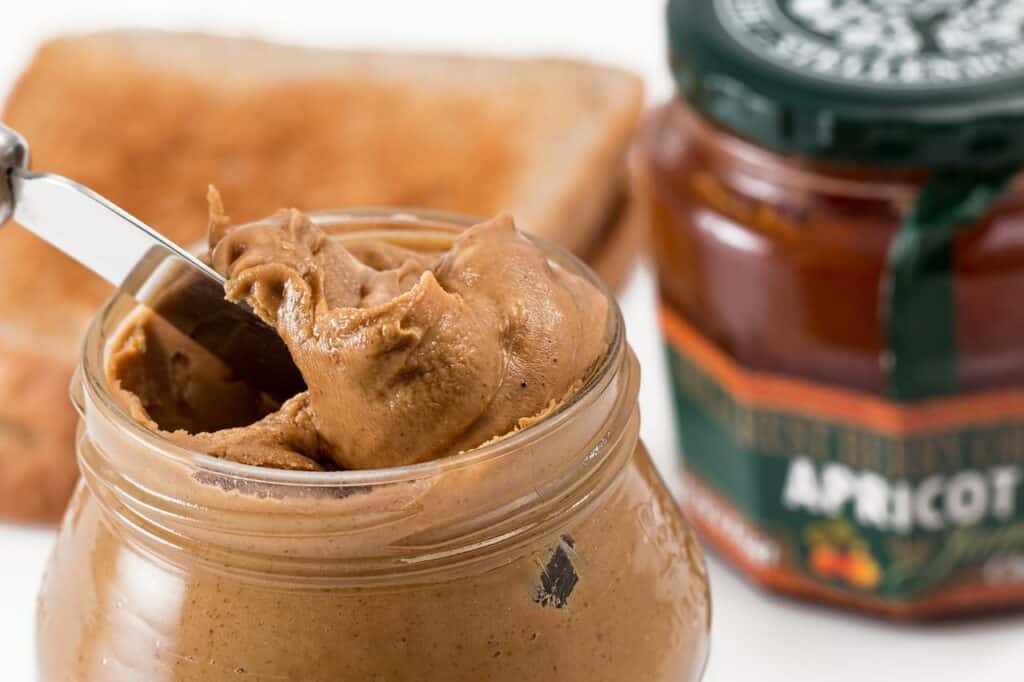Does your dog magically appear in the kitchen every moment you open the jip peanut butter jar?
Interestingly, you’re not alone. Many dog owners give their dogs jip peanut butter from time to time, and this nutty treat indeed drives dogs nuts.
Jip peanut butter is an excellent treat, and most dogs love it.
So, can Dogs Have Jif Peanut Butter?
Yes, Jif peanut butter is safe for dogs to eat in moderation.
Peanut butter is a good source of protein for dogs, and it can also help with joint pain and inflammation.
However, peanut butter should not make up over ten percent of a dog’s diet.
Dogs who eat too much peanut butter may experience gastrointestinal issues such as diarrhea or vomiting.
Besides its nutrients suitable for dogs, jif peanut butter is also helpful when giving your dog pills.
It’s the perfect treat to hide a pill and sip them quietly. Have you ever considered if your dog eating jif peanut butter is good or bad for its health?
In this article, We’ll answer every question related to feeding your dogs with jip peanut butter.

Does jif peanut butter contain Xylitol?
There is no xylitol ingredient in any jip peanut butter. Xylitol is classified as sugar alcohol.
A refined sweetener safe for human beings but may be fatal to dogs.
It generates a high dose of insulin, thus decreasing dogs’ sugar levels, resulting in the dog’s life-threatening hypoglycemia.
Dogs’ low blood sugar levels may cause loss of coordination, collapse, and seizures 30 minutes after intake.
-
What is the safe amount of Jif peanut butter to feed your dog?
Just because jif peanut butter is safe for your dogs doesn’t mean you should feed your dogs 24/7.
Most dog professionals agree that ½ a spoon up to a spoon is excellent.
However, it may seem like a small amount for the big dog owners, but considering that peanut butter is rich in proteins and fats, it’s a proper intake of nutrients in a single treatment.
Additional safety issues to consider when feeding Jif peanut butter to your dogs
Before providing their dogs with jip peanut butter, allergies are the most critical safety precautions every dog owner should follow.
Like human beings, dogs can also be allergic to Jif peanut butter.
If you’re thinking about feeding your dogs with jif peanut butter for the first time, look for the signs and symptoms which determine if your dog is allergic.
Such as:
- Skin irritation
- Hot spots
- Nervous excitement and agitation
- Excessive licking of its skin
- Hair loss
- Difficult breathing (rare case)
- Gastric distress
The safest way to determine if your dog is allergic to jif peanut butter is through your veterinarian.
A veterinarian provides two tests for allergies: blood and Intradermal skin tests.

Nutritional benefits of Jif peanut butter to your dogs
While Jif peanut butter is safe to feed your dogs, does it offer any nutritional benefits for dogs?
Peanut butter is:
- High in protein: Protein is crucial for your dog’s diet. Most Jif peanut butter contains 25% protein. It benefits your dog by providing amino acids that support their immune system, repair, and maintain cells, thus assisting with making hormones, enzymes, and antibodies.
- High fiber: Another significant reason jif peanut butter is beneficial to dogs. Fiber is helps regulate your dog’s digestive system. It’s broken into fatty acids to strengthen the dog’s colon. Fibre speeds up bowel movement, thus reducing the time your dogs’ digestive tract is exposed to carcinogens.
- High in vitamins: It’s a good source of vitamin E. Essential nutrient for dogs. It regulates healthy cells.
- Essential minerals: Contains magnesium, which is vital to a dog’s diet. Dogs suffering from magnesium deficiency have difficulty walking and seizures. Another mineral found in gif peanut butter is manganese which helps dogs produce energy and metabolize proteins and carbs. Jif peanut butter is also high in phosphorus, which functions with calcium to improve bone and teeth strength.
- Excellent in healthy fatty acids: Luckily, jif peanut butter contains a high amount of healthy fats. Polyunsaturated fatty acids such as linoleic acid-containing omega-six promote growth.
Precautions when feeding jip peanut butter to your dogs
Jif peanut butter may have health benefits, but that doesn’t mean it cannot be harmful. Here are concerns to address when feeding your dogs.
- Opt for an all-natural jif of peanut butter: Checking for the harmful addictive in the grocery can be annoying. Dog owners should avoid nasty chemicals like Xylitol and instead go for natural peanut butter options.
- Consider your dog’s health: Jif peanut butter may not be the perfect treat for dogs with health problems. Dogs with obesity, kidney diseases, and special dietary requirements should avoid Jif peanut butter.
- Follow the 10% treat rule: If your dog is nutty about jif peanut butter, it’s good to resolve to limit portions. Giving your dog too much jif peanut butter can lead to health conditions like pancreatitis.
- Avoid Xylitol: Xylitol is highly toxic and poisoning to dogs within a few hours of ingestion.
Some ways to treat your dog with Jif peanut butter
- Stuff a spoonful of jif peanut butter in a KONG toy for a delicious project that will keep your dogs busy.
- Offer a few slurps of Jif peanut butter on a spoon as an occasional treat.
- Use jif peanut butter to disguise medication for your dog.
Conclusion
Now that you have all you wanted to know about feeding Jif peanut butter to your dog, you can feel confident feeding this tasty treat in moderation.
Remember to monitor your pup’s intake and always consult with your veterinarian if you have any concerns about your dog’s diet.
Note any allergic reactions your dog may have to peanuts, and exercise caution when feeding them peanut butter.
Luckily, jif butter does not contain Xylitol and is thus safe for your dogs.
- What Dog Breeds Have Pink Skin? - March 24, 2023
- What Are the Most Inspiring Dog Breeding Quotes? - March 20, 2023
- Can Pheromone Spray Help Improve Dog Breeding Results? - March 19, 2023








